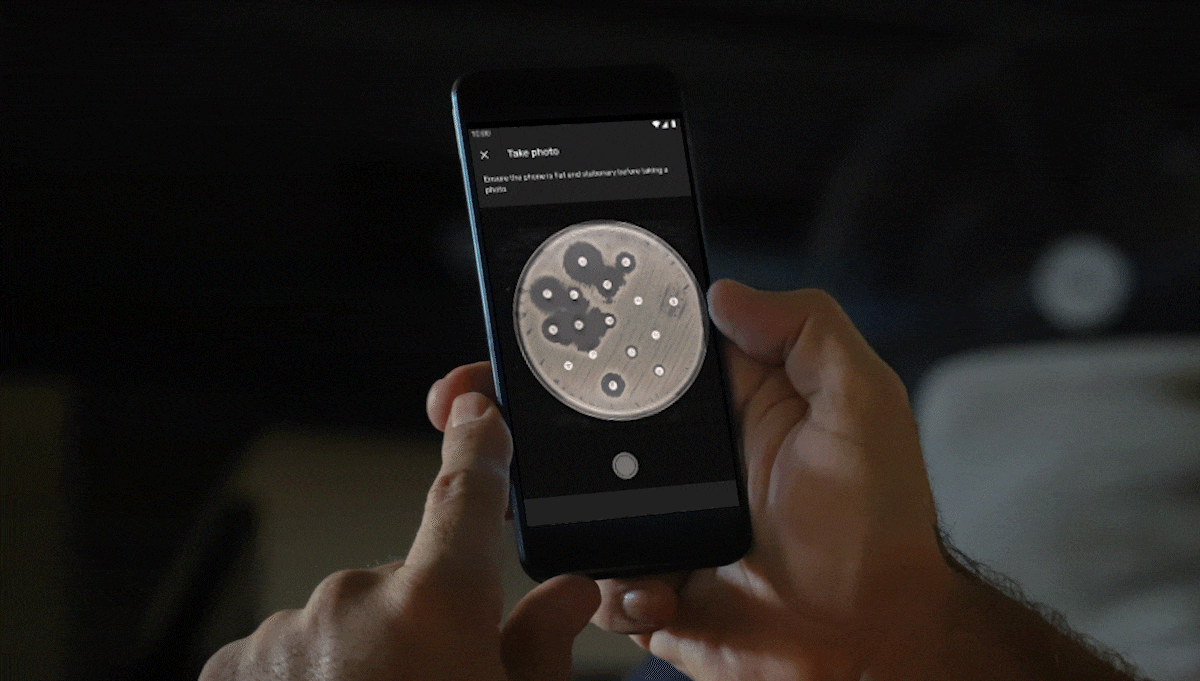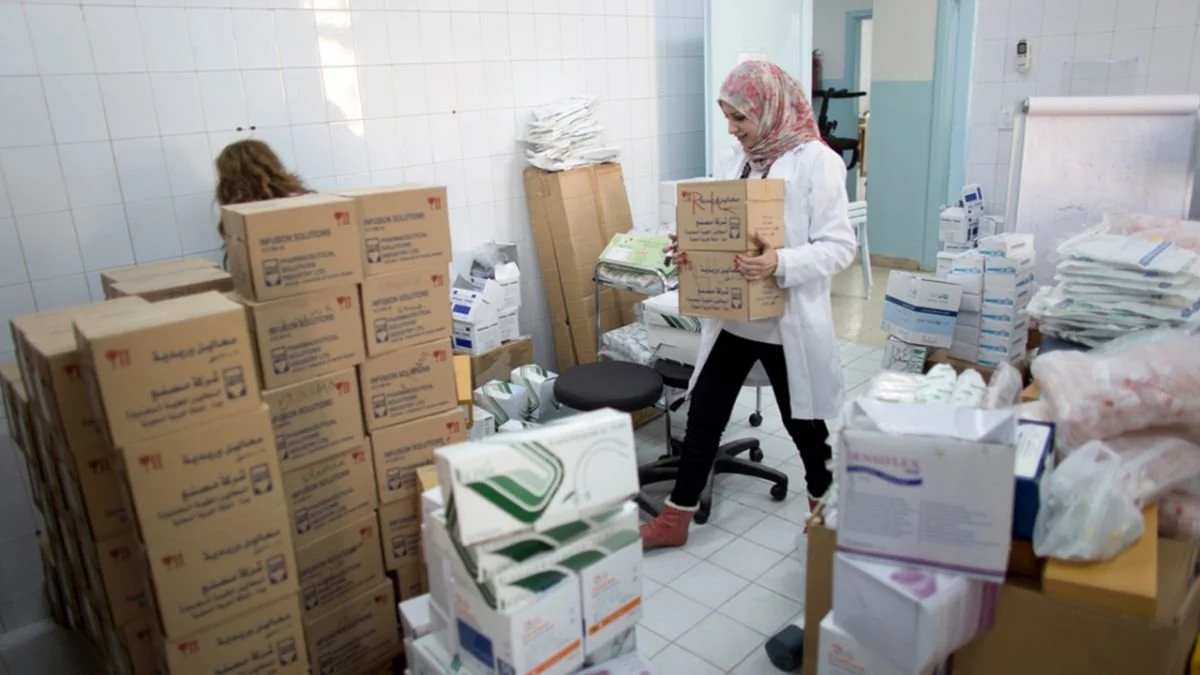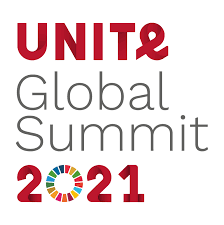MSF Innovation Newsletter February 2022
For a global humanitarian organization as large as MSF, finding and fostering innovations from staff on the ground in more than 70 countries can be challenging. Achieving this requires active knowledge sharing and collaboration across the movement.
In 2022, the Sweden Innovation Unit (SIU) will continue to work for a more systematic exchange of innovation lessons learned among members of the MSF innovation ecosystem, the wider MSF movement, and health innovation enthusiasts outside of the organization. Beyond this newsletter, another key communication channel supporting this work is the annual MSF Innovation Round-Up—check out the 2021 edition.
One excellent example of the power of collaboration and co-creation between MSF staff and local communities is the Story of Change Mentoring Model, featured below. Also in this edition, a snapshot of the new Inclusion of People With Disabilities Hub and Antibiogo, an offline mobile app for reading and interpreting antibiotic susceptibility tests in low-resource settings.
As always, we have curated a list of innovation reading and podcast recommendations at the end. To stay in the know until the next newsletter lands in your inbox in late April, make sure to follow MSF Innovation on Twitter and the SIU on LinkedIn.
We hope you enjoy the read.
Innovation updates from the MSF movement
Antibiogo: An offline mobile app for reading and interpreting antibiotic susceptibility tests in low-resource settings
Antimicrobial resistance (AMR) is a major threat to public health, with an estimated 1,27 million deaths directly caused by AMR in 2019. Low- and middle-income countries (LMICs) are disproportionately affected, partly due to the high burden of communicable diseases.
Misuse and overuse of antibiotics are the main drivers in the development of drug-resistant pathogens. To provide the right treatment to our patients and preserve available antibiotics, MSF has developed a multi-disciplinary approach, which includes activities to ensure access to clinical bacteriology diagnostic laboratories. However, setting up a lab is not easy in many places where MSF works, and access to accurate clinical bacteriology diagnostics remains insufficient in many parts of the world. In response to this gap, La Fondation MSF initiated the Antibiogo project in 2017.
Antibiogo is a mobile app that supports non-expert laboratory technicians measuring and interpreting antibiotic susceptibility tests (ASTs), to help medical staff in low-resource areas prescribe the right antibiotics for bacterial infections. In February 2021, the Antibiogo team’s first scientific paper was published in Nature Communications, proving that the measuring part of the app is as accurate as the manual gold standard.
The Antibiogo Project Roadmap 2022-2024 was recently approved by the Core Executive Committee of MSF. Key milestones in the roadmap include:
Implement Antibiogo in MSF’s bacteriology laboratories in May this year and increase the use of the app in public laboratories that MSF support towards the end of 2022. The end goal is to make Antibiogo available for free for all laboratories.
Self-certify Antibiogo as a mobile device app used for the interpretation of antibiograms in accordance with the In Vitro Diagnostic European Directive (IVDD).
Get Antibiogo certified as an IVD according to the IVD European Regulation (IVDR).
Widen the scope of the app to also include training and surveillance features.
Receive WHO enforcement of Antibiogo as a diagnostics and surveillance tool.
Technical and financial handover of the project for further development and scaling.
For more information about Antibiogo or get in touch with the team, visit antibiogo.org.
Story of Change: A peer-to-peer mentoring model
The MSF Story of Change intervention adopts a collaborative approach to collecting and sharing health information in places where MSF works. The method is taught to MSF staff through a 10 half-days training, available on Tembo (an online education platform for MSF staff) and supported by the Sapling Nursery Fund. In the past three months, an innovative peer-to-peer mentoring model was developed and piloted to scale the Story of Change training.
The mentoring model involves a mentor, a person who has previously completed the training, supporting a group of colleagues currently taking the training. Beyond introducing the training material, the mentor provides support and answers questions from the group during the training days. MSF staff from Pakistan, Nigeria, Sudan, and India participated in the pilot. Mentors and mentees from the different countries were sometimes paired, hence the mentoring model helped facilitate an exchange of knowledge related to health promotion and strengthen the bond between MSF staff working in different countries. The successful pilot was a win-win for everyone involved, those taking the training could apply their new knowledge in discussions with peers and received support from an experienced colleague, while mentors got the chance to strengthen their leadership capabilities.
Read about how the Story of Change approach helped strengthen community engagement, raise awareness, and increase uptake of noma services in Sokoto, Nigeria here.
For more information about the Story of Change approach, visit the SharePoint page here [MSF internal] or email Kelly DeVore (kelly.devore@london.msf.org).
The MSF Inclusion of People With Disabilities Hub launched on January 1, 2022
Around 1 billion people, 15% of the world’s population, live with at least one disability, according to the WHO. People living with disabilities are at a heightened vulnerability of exclusion from health care, poverty, gender-based violence, sexual exploitation and abuse, and human rights violations. Making matters worse, despite being more likely to need humanitarian assistance, people with disabilities are often neglected in the contingency planning, assessment, design, and delivery of humanitarian aid.
The Inclusion of People With Disabilities (PWD) Project, funded by the Transformational Investment Capacity (TIC) and led by Patrice Vastel, MSF Norway, was launched in 2018 to conduct a baseline study to assess how inclusive MSF policies, staff training, and project activities are. The results were used to develop MSF’s Guidelines for Including People with Disabilities and a training module.
The Inclusion of PWD Hub, launched in January this year, is a continuation of the TIC project, which came to an end in 2021. Co-owned by MSF Norway and MSF Central and Western Africa, the goal of the hub is to promote accessibility and inclusive design, raise awareness about people living with disabilities within and outside of MSF, and ensure that this diverse group of patients have equal access to MSF’s services as the general population.
For more information about the Inclusion of People With Disabilities Hub, visit disabilityinclusion.msf.org. If you have any questions or feedback, please connect with Patrice Vastel (patrice.vastel@oslo.msf.org), Coordinator of the Inclusion of PWD Hub.
Negative Pressure Wound Therapy vs. Standard Treatment
At the end of 2014, the Sweden Innovation Unit (SIU) was approached by our colleagues in Amsterdam to assess the potential for improved patient outcomes with Negative Pressure Wound Therapy (NPWT), a therapeutic technique that uses a suction pump with tubes and a sealed dressing to create negative pressure and thereby remove excess exudate and reduce wound size. In 2015-2018, MSF carried out a randomized controlled trial of 165 patients in Jordan and Iraq to compare clinical outcomes for NPWT to those of standard treatment, in collaboration with the Karolinska Institute, Jordan University of Science and Technology, and Hawler Medical University. The study showed that NPWT did not result in clinically superior outcomes compared to standard treatment.
On February 10, 2022, the results of a follow-up study were published in the World Journal of Emergency Surgery, showing a cost analysis of NPWT versus standard treatment of conflict-related extremity wounds in the randomized controlled trial. According to the article, the cost per patient treated with NPWT was $142 (5%) above that of standard treatment in the initial trial.
In this article from 2020, the SIU reflects on our work with the trial and how, as it is easy to get carried away with new innovative solutions, it is important to sometimes take a step back and ensure that decisions are evidence-based—stamina and endurance are key ingredients for successful innovation.
Resource highlight
Last year, we published the first edition of the MSF Innovation Round-Up to showcase the breadth of the MSF innovation ecosystem. This year, we continue the tradition of sharing (some of) MSF’s innovation successes and failures from the past year.
The second edition of the MSF Innovation Round-Up maintains the same easy-to-digest Q&A format, now complemented with short case highlights. Beyond providing an overview of eight MSF innovation entities’ work in 2021, this edition also provides a glimpse into their goals for 2022 and beyond.
Further reading recommendations:
Drugs for Neglected Diseases Initiative (DNDi) published an article spotlighting five ways innovation is changing the fight against Neglected Tropical Diseases (NTD) to commemorate World NTD Day on January 30, 2022.
In a new Conflict and Health article, MSF shares our experience of shifting to Tele-Mental Health services during the COVID-19 pandemic.
Ahead of the Global Disability Summit 2022 (Feb 16-17), this year with the theme “Inclusion in situations of conflict and crisis,” Dr. Maria Kett (The Global Disability Innovation Hub, Co-Founder) and Katherine Perry (Lead for Advocacy and Engagement) met to discuss the role of Assistive Technologies in humanitarian and climate crisis interventions.
The new report "Innovation for Sexual and Reproductive Health (SRH) in Humanitarian Crises" looks at how the SRH community of practice understands innovation and maps innovative interventions against SRH research gaps and needs, by the London School of Hygiene and Tropical Medicine, U. of London, Science Practice, and Geneva Centre of Humanitarian Studies, commissioned by Elrha.
The World Health Organization's report "Global analysis of health care waste in the context of COVID-19" includes one entire chapter focused on innovative solutions for improving environmental sustainability in safe healthcare waste management and 10 case studies illustrating climate-smart management of COVID-19 waste and healthcare waste more broadly.
In our headphones
Connecting Citizens to Science
Participatory Integrated Vector Management
Co-hosted by Dr. Kim Ozano and PhD student Bea Egid, this episode zooms in on integrated vector management (IVM) and the role that communities play in this approach to vector control. The show is guested by Charles Mbogo from the Kenya Medical Research Institute and Hmooda Toto Kafy from the Federal Ministry of Health, Khartoum, Sudan. Connecting Citizens to Science is a production of Liverpool School of Tropical Medicine. Listen here »
UNITE Global Summit 2021
Access to Innovation in Health – Building Hope for an Equitable Future
A recorded session from the UNITE Global Summit 2021, hosted by Unitaid, consisting of two-panel discussions. The first panel addresses critical health barriers for the most vulnerable, innovative tools to address health emergencies, build resilient health systems, and support universal health coverage. The second panel looks at solutions and challenges for COVID-19 therapeutics and diagnostics. Listen here »
Until next time 👋
As always we would love to hear of any global health innovation insights or thoughts. Anything you would like to feature in the next newsletter? Reach out with any questions or comments on comms.siu@stockholm.msf.org or simply reply to this email—we would be delighted to continue the conversation!
Best wishes,
The MSF Sweden Innovation Unit Team







